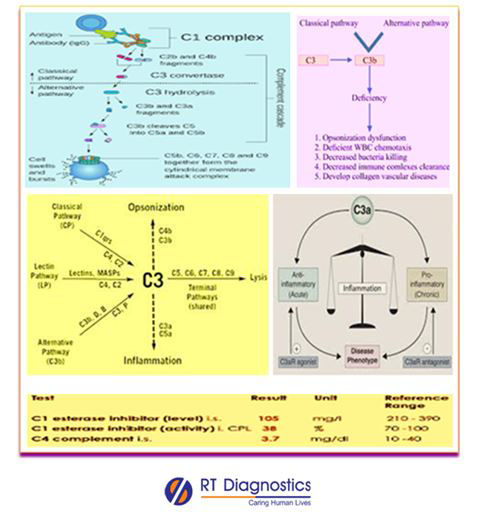C1 LEVEL:
Why C1 Level Test?
CLINICAL INFORMATION
C1 is one of the 9 major proteins in the complement system which helps the body to protect from infections. C1 (first component of the complement cascade) are complement proteins a part of innate immunity that regulates enzymes of the complement, coagulation, fibrinolytic and kinin-forming systems. C1 recognizes foreign cells that may cause disease and they also help remove dead cells and foreign materials. Deficiency or absence (hereditary) of C1 can cause disorders of the immune system and hence complement protein levels are screened in such suspected patients with recurrent infections; hence C1 level test is performed. The main causes of acquired C1-inhibitor deficiency are autoimmune diseases such as lympho-proliferative disease. One of these tests is called C1 esterase inhibitor test or C1-INH test is performed (using fixed-rate time nephelometry) in cases such as unexplained inflammation, swelling (edema), etc. C1 inhibitor or C1 esterase inhibitor (C1-INH) is a multi-specific protease inhibitor (acute-phase protein that increases during inflammation) present in the normal human plasma and serum that belongs to the serpin super-family. The main function is the inhibition of the complement system to prevent spontaneous activation and acts as a main regulatory factor in the immune system (C1 Esterase inhibitor helps control the function of C1). C1 inhibitor irreversibly binds and inactivates C1r and C1s protease in the C1 complex of the classical pathway of the complement system. MASP-1 and MASP-2 proteases in MLB (Mannose-binding lectin or also called mannan-binding protein - MBP) complexes of the lectin pathway is also inactivated. Thus C1 inhibitor prevents the proteolytic cleavage of later complement components C4 (most patients with C1 Esterase inhibitor deficiency have reduced C4 levels) and C2 by C1 and MBL. C1 inhibitor is the most important physiological inhibitor of plasma kallikrein (Fletcher factor), fXIa (Hageman factor), and fXIIa. Deficiency of C1 inhibitor permits plasma kallikrein activation, which leads to the production of vasoactive peptide bradykinin (kinin like peptides enhances the vascular permeability and subsequent acute edema of subcutaneous tissue, the gastrointestinal tract, and/or upper respiratory tract), and moreover, there is unrestricted cleavage of C2 and C4, resulting in auto-activation of the complement system. In chronic prolonged conditions, the circulating C1 levels become very low or absent or become dysfunctional that it predisposes to autoimmune diseases such as lupus erythematosis due to its consumptive effect of the complement factor 3 and 4. Moreover mutations in the gene that codes for C1 inhibitor, SERPING1 may also play a role in the development of macular degeneration. Complications of neglected C1 inhibitor deficiency may lead to angioedema, autoimmune diseases (lupus erythematosis), lymphoproliferative disease (acquired C1 inhibitor deficiency can arise in a patient with lymphoma or in association with an autoimmune disease) and low levels of clotting factors can lead to disseminated intravascular coagulation – DIC. Hereditary angioedema (HA) is otherwise known as C1 esterase deficiency (HA may be caused by an absence or a dysfunctional C1 Esterase inhibitor) is characterized by recurrent episodes of angioedema (synthesis or generation of kinin like substances causes recurrent angioedema of the gastrointestinal tract and genitourinary tracts and larynx – edematous swelling of the larynx can cause respiratory obstruction, asphyxiation and may lead to death and hence is fatal) without pruritis or utricaria. Other symptoms include abdominal pain, vomiting, dehydration, cramping, and red rashes. These skin conditions typically involve legs, hands, face, upper respiratory tract as well as the gastrointestinal tract. Factors that may cause lower C1-INH include malnutrition, blood infection, bacterial infection, lupus, and kidney disease. The screening result for diagnosis for angioedema is confirmed by genetic tests and a blood test that measures the C4 levels in the body (typically C4 levels will be low during and between attacks of angioedema resulting from both type-1 and type II deficiency). Since few cases with C1 inhibitor deficiencies have non-functional proteins, such patients have abnormal function tests. Other tests include functional tests (FC1EQ / C1 Esterase inhibitor – Functional Assays [functional test – It measures the relative functionality of an individual’s C1 Esterase inhibitor protein using an enzyme immunoassay]: Dysfunctional assays are normal or high antigenic assay and/or low functional assay), serum – in the presence of normal/elevated antigen levels. Serum measurement of complement - C1q antigen levels is a confirmatory test in angioedema (Acquired C1 inhibitor deficiency can be distinguished from the hereditary form by measuring C1q levels which are low in acquired form but normal in the inherited).

General Instructions:
Sample Requirement: Specimen - Blood sample collected from the vein. Test Preparation: None.
NOTE - Sample for specimen collections may vary based on the patient’s condition/cases according to the patient’s presenting complaints/signs or symptoms:
SPECIMEN REQUIREMENT (Special or Rare Cases) - As instructed and guided by Physician / Clinician / Pathologist / as per Laboratory’s requirements, according to procedures and protocols.
Sample Requirement: Blood Sample taken from the vein
Test Preparation: None
This Multi-Specialty Clinical Referral Laboratory RT DIAGNOSTICS provides precise and accurate tests with an extensive range of testing services to the medical centers to help in the diagnosis and identification of pathology in the test specimens for infectious diseases and also to evaluate the function of organ systems of the patient. It prevents further complications and helps to stabilize and restore health to near normalcy at the earliest without delay.



